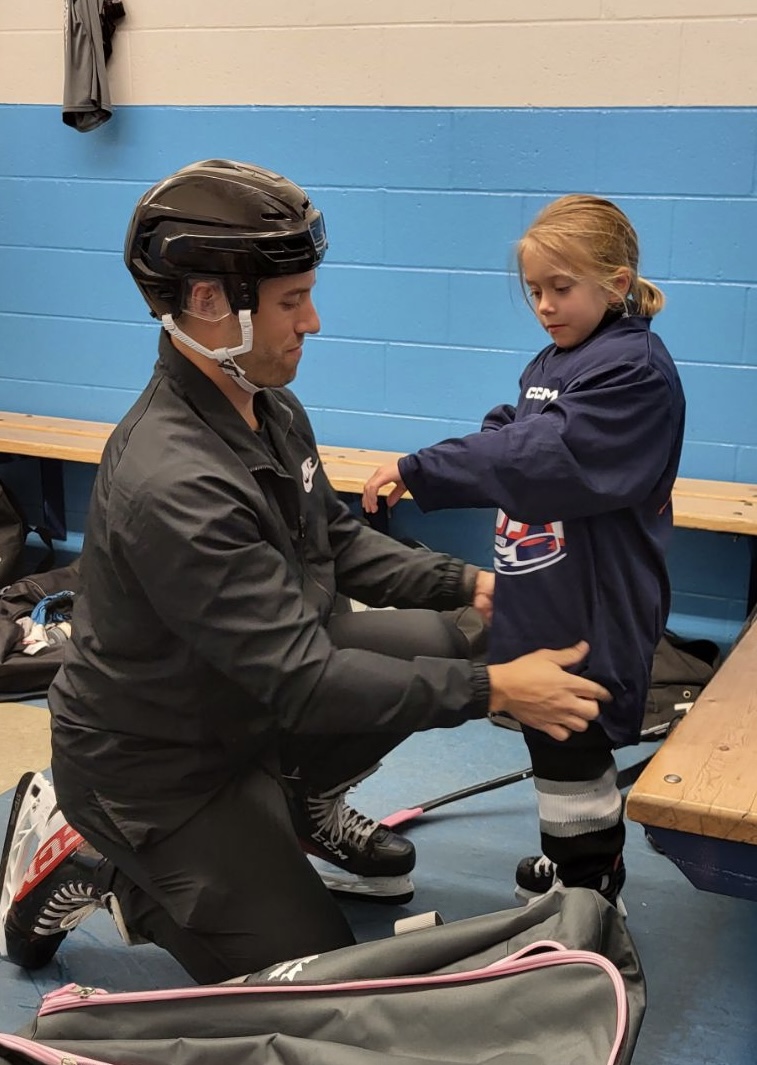Intro to Hockey Program
Ages: 2018, 2017 born (limited to 8 kids)
Requirement: Kids must be able to move around on the ice a little bit on their own. Also must not be enrolled in other hockey.
Time/Dates: Saturdays at 11am from October 14th to January 27th
Where: The Hockey Studio (1828 Blue Heron Drive. London)

More About The Program...
What is Intro to Hockey:
I’ve created this as an alternative to the standard U7 hockey that you will find in most organizations. The season will be shorter, with no travel, same time/place weekly, age-appropriate “drills” (games), fewer kids on the ice, and a scaled-down rink perfect for kids.
Why an alternative model?
Although I want to get my daughters to try hockey, I disagree with many things you find in a typical U7 program. Two skates each weekend can be a lot for kids that are 5 or 6 years old (not to mention for the parents too). Some teams travel to other towns for exhibitions and tournaments, which is unnecessary in my opinion. Kids can play with the same few kids each week and be happy.
But most importantly, I’ve found the drills and style of their practices not to be age-appropriate and boring for most kids.
Most coaches tell the kids that they will get a fun game if they work hard for the first 45 minutes of drills. With 5 and 6-year-olds, I believe kids should be smiling, laughing, and having fun the entire time. The idea is to have them fall in love with the sport and want to come back each week.
What can we expect?
Young kids are "discovery learners" and learn best through experimentation, observation, action & imitation. In other words, play. At these ages, direct instruction can interfere with discovery. So, a coach explaining a technique or correcting kids might look good from the outside, but it's likely not best for kids' development in sports.
My coaching philosophy is to say as little as possible to the kids regarding their technique at this age. I will show them the basics, but mostly, they will learn through experimentation on their own within the games and activities.
This is my first time trying something like this, so I don’t know fully what to expect. But it isn’t without a lot of thought and research.
Will kids play actual hockey games?
Once kids start to get more comfortable on the ice, the plan is to try various variations of hockey games. This includes 3v3, 2v2, maybe even 1v1. Sometimes, we will add more nets, reduce the playing size, etc. Playing the actual game in different forms is the best way for kids to learn once they have enough of the basic skills down. With that said, no scores will be kept.
What equipment do we need?
Full hockey equipment will be needed. I will send more info to anyone interested in signing up. Herm's Sports is a great option for used gear to keep costs down (kids usually grow out of them pretty fast anyways).
About the coach:
Each session will be run by myself (Kevin) and hopefully one on-ice helper. I have recently completed the "Coach 1 - Intro to Coach " with Hockey Canada, along with their "Respect in Sport" and "Gender Identity and Expression" courses. To learn more about my coaching philosophy with young kids you can check out my Athletic Development Games Instagram account.
Here are some of my favourite quotes that represent my coaching philosophies:
"It has long been assumed in traditional coaching that teaching skills to novices must start with task decomposition. That is, we need to take a perceptual-motor skill and break apart into its fundamental components, isolate them, and then have an athlete repeat them over and over. In all these drills, we have broken the natural coupling between information and action. We want kids to learn to coordinate the movement of their feet, while keeping their eyes up, and deciding which way to go based on information they pick up from the movement of the person they are interacting with."
"When children are free to play, they play naturally at ever-advancing edges of their mental or physical abilities."
"There is a time for training and specialized coaching, but now parents seek specialized training before their children play the sport and develop a desire to improve."
"The most frequent reasons for quitting sports reflect an over-seriousness or an inappropriate seriousness for the child's age and maturity: Performance pressure, not enough playing time, boring drills, and negative coaching. Children play sports for the friendships, challenge, learning and fun, which organized leagues often ignore, limit, or eliminate. Consequently, children choose video games."
"Many children quit a sport because coaches and parents eliminate freedom and the instruction and competition fail to arouse an interest."
"They must have a passion for an activity before engaging in deliberate practice because they must love the activity to persist through the drudgeries and mental fatigue of deliberate practice."
"They are unconcerned with mistakes or the right way to kick or throw a ball; they just want to do it. As the activity or sport becomes more interesting, they being to move from simple play or activity stage to where they want to learn the correct way to perform the skill."
"The manner in which parents frame their words after a practice or game can affect the child's mindset, which ultimately affects their improvement, learning and enjoyment. As Dr. Dweck wrote, focusing on the outcomes ("Did you hit a home run?") rather than the processes ("Did you have fun? Did you play hard") can lead a child to develop a fixed mindset, and the child may feel stressed to perform to be good in his or her parent's eye."
Other questions?
Please feel free to text me 519-854-7747 with any other questions you have.
Copyright © AthleticDevelopmentGames.com. All Rights Reserved